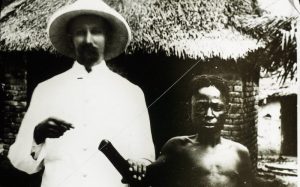History features some of humanity’s perennial sufferings and achievements. They inform us of various events such as the space race, which took humans to the moon and beyond, and two Great Wars causing millions of deaths and endless destruction. What is often excluded is the history experienced by millions beyond Europe and the Americas (with a special mention of Japan), the history of a region referred to as the Global South.
Their untold stories share one common circumstance: colonialism. Their lands and resources were stolen, their houses destroyed, leaving them displaced, enduring subjugation and bigotry, and treatment as dispensable inferiors. The avarice of the colonial powers was flamed by the growth and success of capitalism.
Rest assured, the great nations of Europe regarded themselves to be superior, eventually visibly manifesting in Germany. If one were to read a history textbook, each condemns the diabolical period of Nazi rule (as they must). What they fail to mention are the sentiments shared between the rest of Europe, which were not much different. Although, their targets were of different demographics. Their targets were barely human. As the emergence of a new economic system encouraged colonialist pursuits, it was perpetuated by powerful, often celebrated individuals whose judgements would today be considered objectively deplorable.
No better example of such a figure than the glorified war hero Winston Churchill, who served as the Prime Minister of the United Kingdom from 1940 until 1945 and from 1951 until 1955.
In 1902, Churchill stated the ‘great barbaric nations’ would ‘menace civilized nations’, but the ‘Aryan stock is bound to triumph. One could grant him the benefit of the doubt and assume his nefarious views were regrettable over time but would prove futile given Churchill’s support for ‘Keep England White’ during the West Indies migration in 1955.
His thoughts on Indians, as expressed by Leo Amery, who was known for his role in the government as the Secretary of State for the Colonies (now obsolete), were no different to Hitler’s, proclaiming them as ‘beastly people with a beastly religion who breed like rabbits’ when questioned about the failure of his policies for the Bengal famine of 1943.
The Bengal Famine of 1943 was one of the many famines faced in Bengal (present-day Bangladesh & Indian state of West Bengal) under British colonial rule. It was previously reported as the aftermath of poor weather conditions. Though further research indicates it to be one of the worst man-made catastrophes to occur in the region, and yet it remains unknown in mainstream historical accounts.
War-time inflation and the Japanese invasion of Burma (then a British Colony and important food producer) prompted the British government’s prioritization of Allied nations. They transported food from Asia (including Bengal) to Europe while the farmers propagating the crops were famished for days. The government, under the administration of Churchill, allocated ineffective aid, ensuing in the deaths of around 2-4 million Indians. Churchill’s indifference to this colossal loss of life was hinted at with his inquiry about Gandhi’s living status (brushing this atrocity as insignificant) when asked about the famine.
Churchill’s abhorrent views were no better than any ordinary British. Nevertheless, they were vicious and dehumanizing to what today constitutes 1.8 billion people. His legacy is not the only one threatened by their actions in the Global South.
Under the colonial rule of King Leopold II of Belgium, brute force was utilized to meet the demands of rubber. The hands of the Congolese were deliberately severed if they failed to meet their shares of rubber extracts. While the current Belgian administration, as is every other colonial power, refuses to apologize for this barbarism, the Belgian city of Antwerp celebrates with giant sculptures, pastries and chocolate moulds of severed hands. Under Belgian rule, over 10,000,000 Congolese lives were lost in a forgotten genocide unknown to the world.

As the infamous quote by Churchill himself goes, “History is written by victors”: a distorted, false history venerating the worst of personalities.
It is long overdue that we acknowledge the horrifying actions of revered personalities of the past. Historical documentation must include the grim realities faced by all of mankind. History should be global. Governments of former colonial powers must apologize at the very least, and the victims must be honored, and their students aware of their history as only by knowing we will be able to avoid the occurrence of similar devastating events.
As social media gains prominence, hiding the bitter truth has become an almost impossible task; as individuals delve further into the past, true accounts are unveiled. And this newfound tradition must continue.
Sources Addison, P. (2005) Churchill: The Unexpected Hero. Oxford: Oxford University Press Barnes, J. & Nicholson, D. (1987) The Empire at Bay: The Leo Amery Diaries, 1929-1945. London: Hutchinson Folsom, J. (2016) ‘’Antwerp’s Appetite for African Hands’, American Sociological Association [online] 15 (4), 67-69. Available from <https://journals.sagepub.com/doi/pdf/10.1177/1536504216685112> [26 June 2022]
Hickel, J. (2022) ‘How British Colonizers Caused the Bengal Famine’, New Internationalist [online] available from <https://newint.org/features/2021/12/07/feature-how-british-colonizers-caused-bengal-famine> [25 June 2022]
Ohlinger, G. A. (2015) ’Finest Hour 159 – WSC: A Midnight Interview, 1902’, International Churchill Society [online] available from <https://winstonchurchill.org/publications/finest-hour/finest-hour-159/wsc-a-midnight-interview-1902/> [25 June 2022]








Be First to Comment